

Association for Library Collections & Technical Services (ALCTS) This selection of resources may be useful as an accompaniment to ALCTS webinar series on institutional repositories.
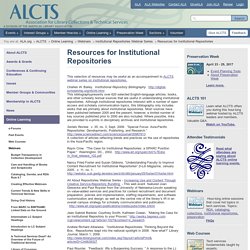
Charles W. Bailey. Institutional Repository Bibliography. This bibliographypresents over 620 selected English-language articles, books, and other scholarly textual sources that are useful in understanding institutional repositories. Although institutional repositories intersect with a number of open access and scholarly communication topics, this bibliography only includes works that are primarily about institutional repositories.
Serials Review. v. 35, no. 3, Sept. 2009. Raym Crow. Nancy Fried Foster and Susan Gibbons. Jean Gabriel Bankier, Courtney Smith, Kathleen Cowan. Andrew Richard Albanese. Paul Royster. Marisa Ramirez. DigitalCommons@CalPoly Annual Report to the Provost. The Research Library’s Role in Digital Repository Services: Final Report of the ARL Digital Repository Issues Task Force. Mary Westell. Kerrie L. Richard W. Marilyn Moody. Arl br 226. SPARC - ir guide checklist v1. SPARC Europe - Institutional Repositories. A repository may contain a wide range of material that reflects the intellectual wealth of an institution – for example, journal articles submitted for publication, articles(pre-prints) accepted for publication (post prints), conference papers, working papers, doctoral theses and dissertations, datasets resulting from research projects, etc. – or they may focus on just one class of material, e.g. peer-reviewed papers.
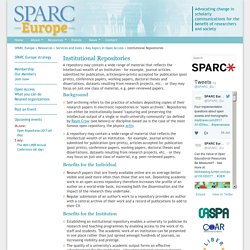
Background Self-archiving refers to the practice of scholars depositing copies of their research papers in electronic repositories or ‘open archives’. Benefits for the Individual Research papers that are freely available online are on average better visible and used more often than those that are not. Benefits for the Institution. Making Institutional Repositories Work. Description Quickly following what many expected to be a wholesale revolution in library practices, institutional repositories encountered unforeseen problems and a surprising lack of impact.
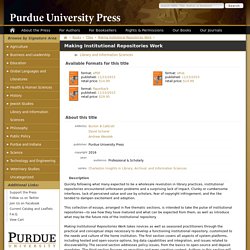
Clunky or cumbersome interfaces, lack of perceived value and use by scholars, fear of copyright infringement, and the like tended to dampen excitement and adoption. This collection of essays, arranged in five thematic sections, is intended to take the pulse of institutional repositories—to see how they have matured and what can be expected from them, as well as introduce what may be the future role of the institutional repository. Digital Repositories. Institutional Repositories: Partnering with Faculty to Enhance Scholarly Communication. From its earliest days, SPARC (the Scholarly Publishing and Academic Resources Coalition) has explored strategies to unleash the power of the digital networked environment in order to enhance the process of scholarly communication and address the serious economic problems that plague it.
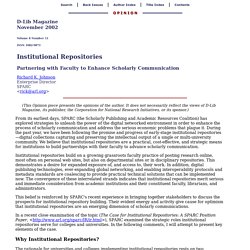
During the past year, we have been following the promise and progress of early-stage institutional repositories—digital collections capturing and preserving the intellectual output of a single or multi-university community. We believe that institutional repositories are a practical, cost-effective, and strategic means for institutions to build partnerships with their faculty to advance scholarly communication. Repositories. (#2) What is an institutional repository? I’d like to introduce you to IUScholarWorks Repository and explain what it can do for you, the IU researcher.
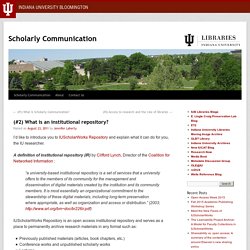
A definition of institutional repository (IR) by Clifford Lynch, Director of the Coalition for Networked Information : “a university-based institutional repository is a set of services that a university offers to the members of its community for the management and dissemination of digital materials created by the institution and its community members. It is most essentially an organizational commitment to the stewardship of these digital materials, including long-term preservation where appropriate, as well as organization and access or distribution.” (2003; Share and preserve research data. Data sharing Data sharing is often a natural part of the research process; however, your funding agency may require that you share your data or make them publicly accessible.
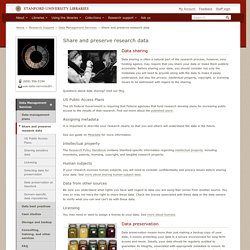
Before sharing your data, you should consider not only the metadata you will need to provide along with the data to make it easily understood, but also the privacy, intellectual property, copyright, or licensing issues to be addressed with regard to the sharing. Questions about data sharing? Visit our FAQ. US Public Access Plans The US Federal Government is requiring that Federal agencies that fund research develop plans for increasing public access to the results of that research. Assigning metadata It is important to describe your research clearly so that you and others will understand the data in the future. See our guide on Metadata for more information. Intellectual property. Data management plans. About data management plans (DMPs) A data management plan (DMP) is a written document that describes the data you expect to acquire or generate during the course of a research project, how you will manage, describe, analyze, and store those data, and what mechanisms you will use at the end of your project to share and preserve your data.
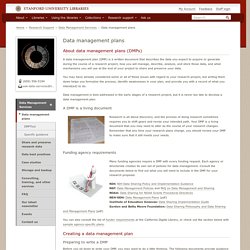
You may have already considered some or all of these issues with regard to your research project, but writing them down helps you formalize the process, identify weaknesses in your plan, and provide you with a record of what you intend(ed) to do. Frequently Asked Questions: Institutional Repository. (End of Questions) 1.
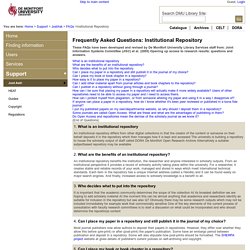
What is an institutional repository An institutional repository differs from other digital collections in that the creator of the content or someone on their behalf deposits it in the repository which then manages how it is kept and accessed The university is building a repository to house the scholarly output of staff called DORA De Montfort Open Research Archive Alternatively a suitable subjectbased repository may be available 2. SHERPA/RoMEO - Publisher copyright policies & self-archiving. From Social to Scholarly and Back Again.
SHARE is a higher education initiative whose mission is to maximize research impact by making research widely accessible, discoverable, and reusable. - Héloïse - Politiques des éditeurs en matière de dépôt des articles.